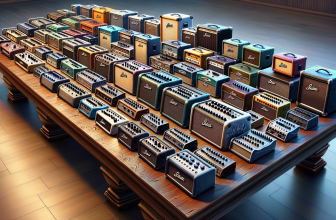
Are you tired of being tethered by guitar cables during your performances or jams? The era of wireless technology has also revolutionized how we play our guitars. With a myriad of choices out there, it can feel like finding the right wireless guitar system is like searching for a needle in a haystack. But fret not; this review will guide you through some of the best wireless guitar systems on the market. Whether you’re playing on stage, rehearsing with your band or practicing at home, we’ll ensure you find the system that frees you up to rock out with complete abandon.
Our Top Picks
Our #1 Top Pick: Shure GLXD16 Wireless System
The Shure GLXD16 stands out as the gold standard in wireless guitar systems. Known for its pristine audio quality and reliable performance, this system boasts LINKFREQ automatic frequency management, which intelligently identifies the best open channels. Its bodypack features a rugged metal construction, ensuring it can withstand the rigors of the road. The GLXD16 also comes with a built-in tuner that’s viewable on the receiver’s LED display, adding great value for gigging guitarists. Its rechargeable battery provides up to 16 hours of continuous use, and you can keep track of battery life in real time with the detailed display. Though pricey, the Shure GLXD16’s crystal-clear sound and solid reliability justify the investment for serious musicians.
Pick #2: Line 6 Relay G10 Wireless Guitar System
For those who prioritize simplicity and ease of use, the Line 6 Relay G10 is an attractive option. This plug-and-play system requires no setup; you simply plug in the transmitter and it automatically syncs with the receiver. It boasts up to 50 feet of range and provides 24-bit digital audio quality that captures every nuance of your performance. The convenience factor is further enhanced by the integrated battery that charges as soon as you dock the transmitter with the receiver, offering up to 8 hours of play time. It’s less conspicuous than other systems, making it ideal for musicians who want to maintain a traditional stage appearance.
Pick #3: AKG WMS 40 Mini Wireless Instrument System
The AKG WMS 40 Mini is a perfect entry-level wireless system, delivering quality without breaking the bank. It’s compact and straightforward, with a miniature transmitter that connects directly to your guitar, eliminating the need for a bodypack. Despite its small size, it provides a clear signal that resists dropouts and a dependable 30-hour battery life from a single AA battery. The plug-and-play design means there’s no complex setup, making it ideal for those who want to go wireless without complication. However, the fixed frequency operation might limit its use in environments with multiple wireless systems.
Pick #4: Sennheiser EW 100 G4-Ci1 Wireless System
When it comes to professional-grade wireless systems, the Sennheiser EW 100 G4-Ci1 is a top contender. This robust system offers a higher-than-average range of 330 feet, providing exceptional freedom on stage. The bodypack transmitter and CI1 instrument cable deliver high-quality sound transmission without compromise. Frequency agility is a key feature with the G4-Ci1, allowing quick frequency changes to avoid interference, all while maintaining a strong and steady signal. The metal construction of both transmitter and receiver promises durability, and the intuitive interface makes operation simple for users of all levels.
Pick #5: Boss WL-50 Guitar Wireless System
The Boss WL-50 system appeals to those who seek unobtrusive and straightforward wireless play. Its receiver sits neatly on your pedalboard, functioning like a standard stompbox. This system provides an impressive 12 hours of play time with its built-in rechargeable battery, and the short latency ensures your playing is as responsive as it would be with a cable. The WL-50 employs motion-sensing technology to save power; the transmitter goes to standby when the instrument is inactive, a smart feature that extends battery life. While it might not have the range of some professional systems, it’s a solid choice for practice sessions and smaller gigs.
What to Know Before You Buy
- Frequency Bands: Understand the frequency bands used by wireless systems, such as UHF or 2.4 GHz, and their implications on signal clarity and range.
- Battery Life: Different systems offer varying battery lifespans. Consider how long you’ll need your system to operate between charges.
- Transmission Range: The space you’re playing in can dictate the necessary range of your wireless system, be it a small bar or a large outdoor festival.
- Build Quality: Durability can be crucial, especially for touring musicians. Look for systems that can withstand the wear and tear of constant use.
- Setup Complexity: Some systems offer plug-and-play functionality, while others require a more detailed setup. Consider your tech comfort level.
Factors to Consider Before Buying
- Audio Quality: Search for a system that doesn’t compromise on sound fidelity and provides a clean, clear tone that’s true to your instrument.
- Compatibility: Make sure the system is compatible with your guitar, pedals, and amplifiers, avoiding potential connection issues.
- Latency: Excessive delay between playing a note and hearing it can be disorienting. Aim for a system with low latency to maintain synchronicity.
- Channels: If you plan to use multiple wireless systems simultaneously, you’ll need one with multiple channels to avoid interference.
- Portability: If you travel frequently with your system, consider its size and weight. A compact design can make a big difference on the road.
Why Trust ChooseRight?
At ChooseRight, we understand that musicians seek quality and reliability in their equipment. That’s why we meticulously reviewed these products, delved into thousands of user reviews, and sought feedback from professional guitarists. Our commitment is to provide you with the most comprehensive and unbiased information, ensuring that you can make an informed decision when choosing the best wireless guitar system for your unique needs.
Finishing Thoughts
Embarking on the wireless journey can liberate you from the constraints of cables and give you the freedom to move and perform in ways you’ve never experienced before. From our top picks to our buying advice, we hope this article has clarified your options and will help you make a choice that suits your musical lifestyle. Remember, the best wireless guitar system for you is the one that best blends sound quality, ease of use, and reliability while fitting into your budget. Happy strumming!
Frequently Asked Questions
What is a wireless guitar system and how does it work?
A wireless guitar system is a device that allows guitar players to connect their guitar to an amplifier or PA system without the need for traditional instrument cables. It typically consists of a transmitter that is connected to the guitar and a receiver that is connected to the amp. The transmitter sends the guitar signal as radio frequencies to the receiver, which then converts it back into an audio signal.
Will a wireless guitar system affect my sound quality?
Modern wireless guitar systems are designed to transmit high-fidelity audio without compromising sound quality. However, some models may introduce a slight amount of hiss or compression. It is generally a good idea to read reviews and test out a system before purchasing to ensure it meets your sound quality expectations.
What should I look for when choosing a wireless guitar system?
Important factors include range, frequency response, battery life, and the presence of multiple channels to prevent interference. Additionally, you might consider its ease of use, the robustness of the transmitter and receiver, and compatibility with your existing gear.
Can I use a wireless guitar system with active pickups?
Yes, most wireless guitar systems work with both active and passive pickups. Always check the specifications or ask the manufacturer if you are unsure about compatibility with your instrument’s pickups.
How far can I move from the receiver without losing the signal?
The range of a wireless guitar system varies depending on the model and the environment you are playing in. Some systems offer ranges of up to 300 feet or more under optimal conditions, but always check the specifications for exact figures.
Can wireless systems be used with bass guitars as well?
Yes, wireless systems can generally be used with any electric instrument, including bass guitars. Make sure the system has an appropriate frequency response that accommodates the lower range of the bass.
How do I prevent interference from other wireless devices?
Look for a system that offers a range of different channels and frequencies so you can switch to a less crowded channel if you experience interference. Some high-end models have automatic frequency scanning and selection to minimize interference risks.
Is it difficult to set up a wireless guitar system?
Most wireless guitar systems are designed to be as user-friendly as possible, with simple plug-and-play setups. Detailed instructions are included with purchase, and many models require minimal configuration.
Do I need a special amplifier for a wireless guitar system?
No, wireless guitar systems are designed to be compatible with most amplifiers and PA systems. The receiver typically outputs through a standard ¼-inch jack or XLR plug.
What is the typical battery life of a wireless guitar system’s transmitter?
Battery life varies significantly depending on the model and usage, but many transmitters can last anywhere from 4 to 12 hours on a single charge or set of batteries. It’s important to check the specifications of the system for battery life details.
Are there any limitations when using a wireless guitar system during a live performance?
Other than the limited range, which can be mitigated by choosing a system with a long enough range for your needs, there are no significant limitations. However, practicing good wireless protocol, such as monitoring battery life and choosing clear frequencies, is essential.
Can I connect multiple instruments to one receiver?
Some wireless systems are designed to handle multiple transmitters with a single receiver, but this feature is not standard. You will need to look for a system specifically designed for this purpose or set up multiple single-channel systems.







